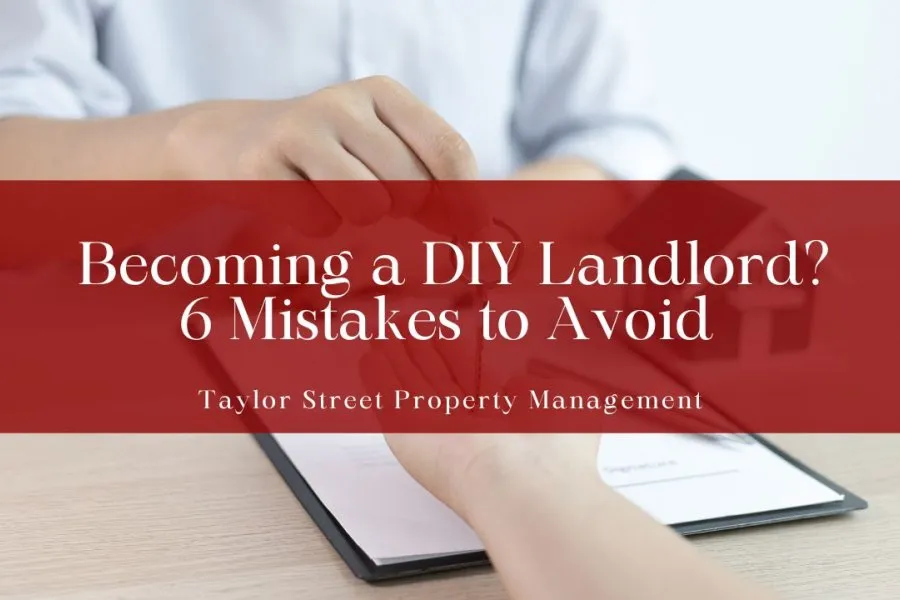Do-it-yourself landlords are a common sight in every real estate market. While some landlords manage their rental properties well, others struggle when they’re faced with the many challenges of property management.
Maybe you put money into your home with the idea of renting it out, or maybe it was just a coincidence. In any case, there are a few strategies you can use to protect yourself from going to court or taking a financial beating from a property management mistake.
To help new landlords like yourself, we at Taylor Street Property Management have compiled a list of the top six errors that “Do-it-Yourself” landlords frequently commit and some ways to avoid them.
Draft a Solid Lease Agreement

Particularly when renting to friends and family, new landlords may forget to draft a lease. This may cause an issue if there are further disputes down the road. So, draft a solid leasing arrangement in order to avoid this outcome.
If all parties involved in the rental process process sign the written agreement, you are more protected. A written agreement instructing the tenants on the agreed-upon terms and conditions is significantly simpler.
Additionally, the document serves as legal evidence that can be used in court if a dispute arises. You can either employ a property management business to create the agreement or a lawyer before giving it to your tenant.
Perform Regular Property Inspections
Inspections also allow you to confirm if your tenant is abiding by the conditions of the lease or not. It is your duty as a property owner to keep your rental in a secure and in great condition throughout the duration of the lease.
Most landlords wait until their tenant calls to seek maintenance. But you can prevent long-term property problems by doing routine inspections. Being proactive will help you decrease the frequency and overall expense of repairs.
Screen Tenants Thoroughly
A thorough screening procedure could spare you a lot of trouble in the future. Understandably, some landlords may want to fill their vacant units as quickly as possible, but because your property is an investment in the long term, you want to ensure it’s in good hands.
By interviewing potential tenants, you may determine if they are a suitable fit for your rental and look out for any warning signs. To start, you can review their credit history to learn about their financial situation.
Furthermore, you can confirm a candidate’s income by asking for pay stubs, credit rating, or confirming additional sources of income. Most importantly, get in touch with the potential tenant’s past landlords to learn more about their character.
If you have a lot of applications, it helps to create a set of selection criteria based on things like the applicant’s application date, financial stability, etc. to narrow down your list of prospective tenants.

Evict When Needed
When Renters and DIY landlords communicate well with each other, they tend to build a positive relationship. But a DIY landlord may be softer than a property manager as they have a personal relationship with the tenant.
Remember that property managers are impartial intermediaries during difficult situations. So, without their input, you will have to deal with tenants who pay late and potentially evict the tenant yourself.
It’s a good idea to find a local attorney who specializes in evictions if you need to file one. Ensure that all of your documentation is available to them and that everything is in order in regard to legal matters.
Set the Right Rental Rate
Setting the appropriate rental rate is important, but it involves more than just considering the size and location of the property. While the number of bedrooms and living space in a unit does matter, other factors are also important.
Without conducting any research, determining the appropriate rental rate could lead to it being set either too high or too low. Setting the rent too high can turn away prospective tenants but if your rental rates are too low can also result in monthly income loss.
To calculate the optimal rental rate for each property, investors must consider nearby properties, the rental’s location, and other aspects. If you’re unsure of how to assess your home and the market, a property management firm like us at Taylor Street can provide you with the information and insights and ROI numbers you require.
Do Your Research

Just because information is available to you does not mean that you should have confidence in it when making financial decisions.
For example, if you visit Zillow or Trulia, they can recommend that your property is worth a specific sum of money. The estimate may actually be 20 to 30 percent higher than the market value. So, if you take that advice, your house will be on the market for a while.
At Taylor Street Property Management, we use accurate market value data from reliable sources that have been corroborated by regional real estate boards. We are confident and certain in the reliability of our market expertise.
Bottom Line
To cultivate an amazing reputation and a superior tenant living experience, our seasoned residential property management staff goes above and beyond industry standards.
We offer your assistance with marketing and promotion when you have vacant units and as your rental property ages. Taylor Street Property Managers develop high-quality listings utilizing the best professional photography and videography to help you find and keep great tenants for your single-family or multi-family property.


